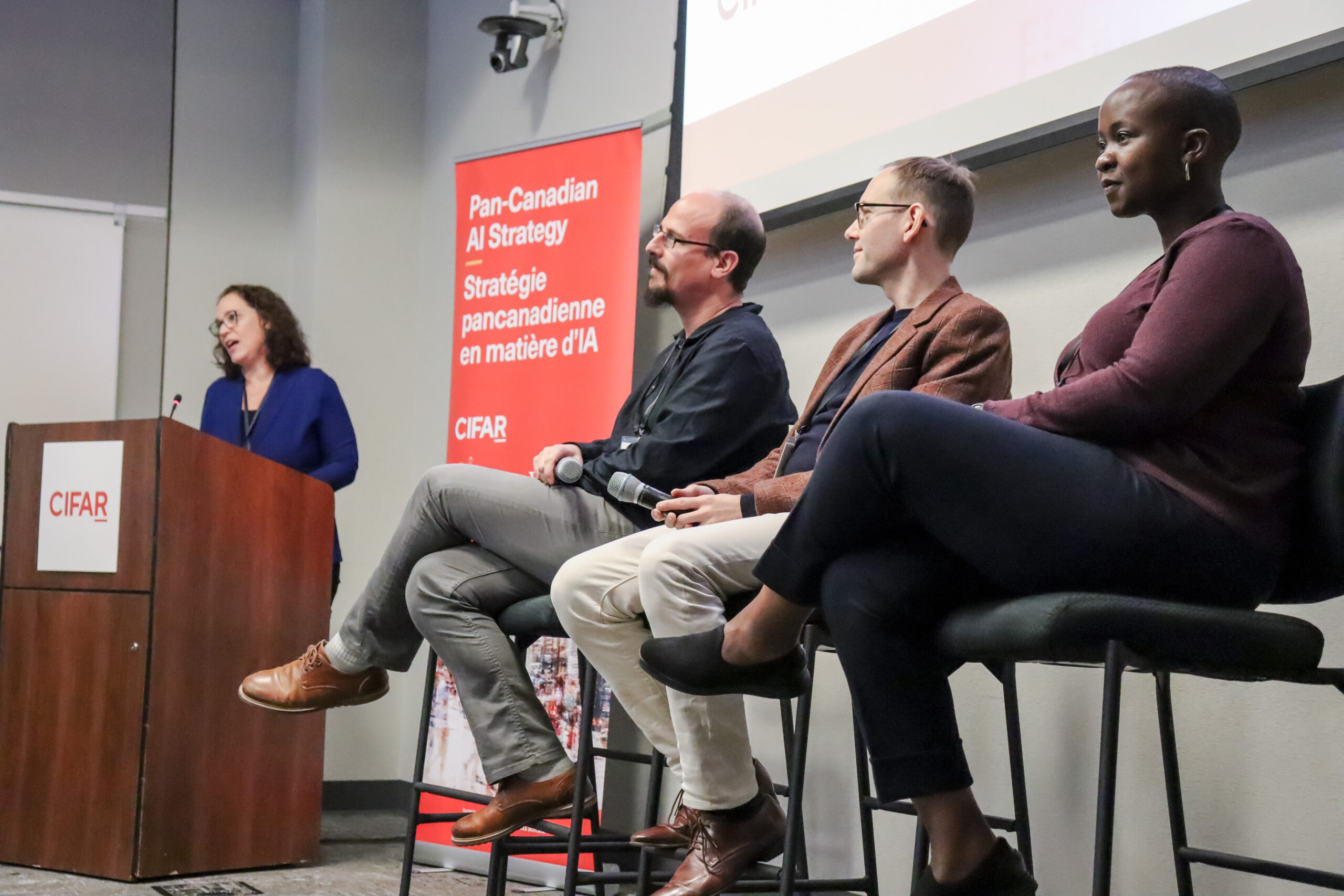By: Justine Brooks
12 Dec, 2023

In mid-November industry leaders came together for an invitation-only CIFAR + RBC Generative AI Leadership Forum to discuss the opportunities and challenges of deploying generative AI tools across a wide range of sectors. The day included a variety of presentations, with breakout discussions about how generative AI is affecting their companies and how it can be deployed safely.
Among the presentations was keynote speaker Foteini Agrafioti, Chief Science Officer at RBC and Head of Borealis AI. Agrafioti spoke about Canada’s world-leading adoption of the Pan-Canadian AI Strategy, noting that the creation of Canada’s three national AI institutes, Amii, Mila and the Vector Institute, was the “first step in changing the direction of machine learning.” This proximity of Canadian talent means research can quickly be translated into commercial applications, an advantage she cited as the reason for Canadian banks scoring higher on AI readiness and maturity compared to the U.S. and Asia in a recent report by the UK-based data intelligence firm Evident.
“Generative AI brings with it tremendous opportunity for Canadian businesses and can be leveraged to increase productivity and/or reduce costs,” said Agrafioti. “Canada has been a leader in AI and it is essential to remain competitive by seizing our advantage in this domain and moving forward with its responsible adoption. In our backyard today, there are AI experts that go beyond prompt engineering and can stretch the capabilities of Generative AI to fit the needs of our businesses.”
Following Agrafioti’s opening address, a panel of industry and research experts discussed the potential opportunities of generative AI. Among the panelists was Shingai Manjengwa, Head of AI Education at ChainML, Marc Bellemare, co-founder of Reliant AI and a Canada CIFAR AI Chair at Mila, and Guillaume Rabusseau, also a Canada CIFAR AI Chair at Mila and a research lead for a newly-announced collaboration between Mila and Zapata AI.
About the difficulties in translating research into real world solutions, Bellemare said, “I think the biggest challenge is understanding, how do we do research that is state of the art but at the same time solves a real problem?” Relating examples at his own start-up Reliant AI, which provides generative AI solutions for industry, he suggested that companies should treat business problems as research questions.
After a short breakout for attendees to discuss their own business adoption and challenges with generative AI, a series of speakers presented examples of use cases. Bruce Dewar of LIFT Impact Partners spoke about teaching and measuring impact in not-for-profit organizations, Benjamin Alarie from Blue J Legal spoke about the applications of generative AI to tax law and Madalin Mihailescu of Georgian Partners spoke about how venture capital firms can support generative AI adoption in their portfolio companies and in their own business units.
Rounding off the afternoon was Taylor Owen, Beaverbrook Chair in Media, Ethics and Communications, Director of the Centre for Media, Technology and Democracy and an associate professor at the Max Bell School of Public Policy at McGill University. Owen discussed the larger implications of generative AI, drawing connections to the emergence of social media, comparing the political influence and lack of regulation from the early years of social media to the current AI landscape.
“It’s clear that maximizing the benefits of an emerging technology means normalizing them into our systems and institutions of democratic governance,” said Owen, noting the importance of bringing citizens into regulatory conversations, and ensuring that the complexity of AI regulation does not hamper rapid response to this fast-moving opportunity for innovation.
The findings from the Forum will be incorporated into a forthcoming report by RBC on the opportunities presented to Canadian businesses by generative AI.
Learn more about how CIFAR and Canada’s three National AI Institutes are advancing commercialization and adoption of AI in Canada on our impact page.
Banner image: Elissa Strome, Executive Director of the Pan-Canadian AI Strategy at CIFAR moderates a panel discussion with industry leaders Guillaume Rabusseau, Marc Bellemare and Shingai Manjengwa.
CIFAR is a registered charitable organization supported by the governments of Canada and Quebec, as well as foundations, individuals, corporations and Canadian and international partner organizations.